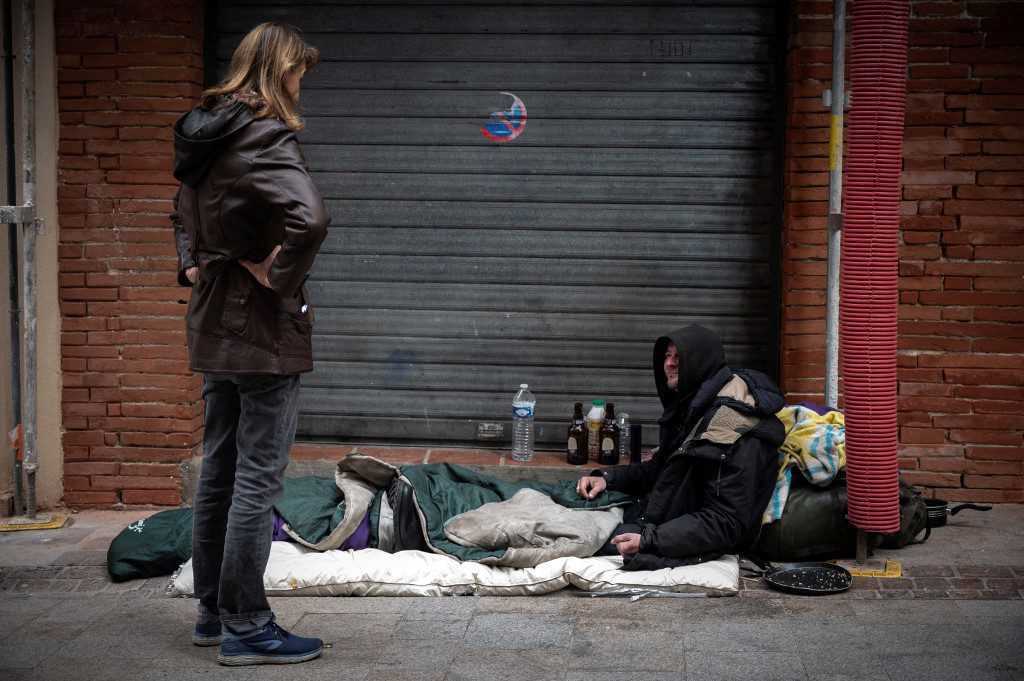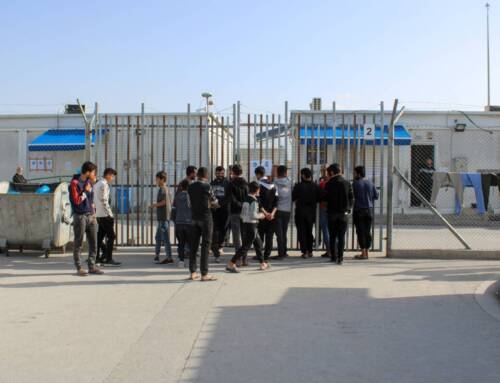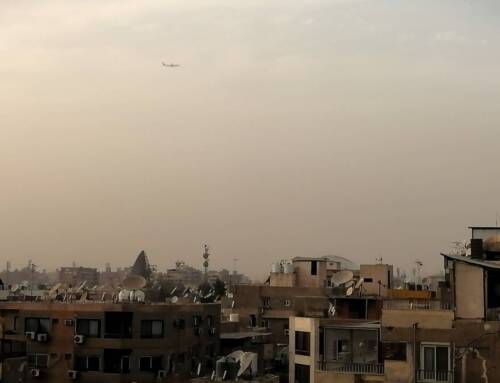Syrian “essential” workers hope for citizenship after serving on France’s COVID-19 frontlines
After extenuating months on the frontline of the COVID-19 response, some relief is in sight for Roubi Kilo, a 27-year old refugee from Syria’s northern city of Aleppo.
12 January 2021
A woman proposes help to an homeless man in a street of Toulouse, France, 2/4/2020 (AFP)
AMMAN — After extenuating months on the frontline of the COVID-19 response, some relief is in sight for Roubi Kilo, a 27-year old refugee from Syria’s northern city of Aleppo.
A pharmacist by training, Kilo worked throughout the pandemic in the research department of a French hospital, studying the virus and treatment protocols. Now, Kilo is among thousands of refugees and migrants who could benefit from a measure to facilitate access to French citizenship, targeting foreign workers active on the health frontline and in essential economic sectors.
Kilo speaks perfect French and initially applied for citizenship in 2019. However, the naturalization services in her city (Lyon) are notoriously slow. Kilo was told she could expect her first appointment with the competent authorities – designed to evaluate the candidate’s degree of integration in French society – after three years. But after adding a justification document to her application, mentioning her work during the pandemic, she was told she might receive an appointment in the coming three months.
Foreign workers: pillars of the COVID-19 response?
Like many European countries, France witnessed unprecedented strain on essential services during the pandemic. As the economy stalled and people were requested to stay home, the country’s ability to function hinged precariously on a thinning layer of its most vulnerable – including a large share of migrants and refugees.
Syrian doctors made the news for their contribution as first responders. Medical staff also played a crucial role, like Aicha al-Kurdi, a refugee who completed her nursing studies in France. “Three days after earning my certificate, I started working in the ambulance department, and I have been there ever since,” she told Syria Direct.
Essential transportation services kept running despite the personal risks faced by workers like Ahmed Khaled (a pseudonym), a 36-year-old school bus driver originally from Syria’s southern province of Daraa. “My profession was never easy during the lockdown,” Khaled told Syria Direct, “because the bus driver is in direct contact with people, including frontline staff and those most vulnerable.” Khaled was infected by the virus during his eighth month on the job and recovered.
Maintenance workers, house helpers and agricultural laborers supported essential services, like Mahmoud al-Homsi (a pseudonym), a Syrian delivery worker. “I did not stop working for a single day of the pandemic,” he told Syria Direct.
All foreigners who worked in these sectors during the pandemic are eligible to add a corresponding justification document, in order to “facilitate” and accelerate their naturalization application. By December 22, 2020, the Ministry of Interior announced that around 700 people were already on the brink of being naturalized based on this criteria.
Nationality: a breath of stability
“The nationality is crucial for me because I am terrified of returning to Syria,” al-Kurdi said. She is worried about the growing political pushback against refugees, “as we see happening in other European countries,” adding, “It is also important for my children [who are growing up here].”
Others are concerned about their access to civil and political rights. “Citizenship will allow me to have the same right as others: to be able to vote, to earn the same salary, and to be able to travel and visit my family,” Kilo said.
Khaled, who arrived in France in 2015, cited freedom of movement and access to work opportunities as key advantages of becoming French. However, “my main reason for requesting citizenship is that I admire the values and principles of the French Republic,” he said.
Naturalization applications are managed by the local territorial administration, and the speed of the process can vary significantly between regions. “You [normally] have to wait for a year or more to get an appointment for the interview, and the appointment may come a year later. After the interview, there is also a long waiting period to get the result,” al-Homsi said.
A slim chance at naturalization
While many Syrians hoped to bypass some administrative hurdles and benefit from a more favorable political climate, some were left disappointed.
“I applied for naturalization in December because I meet all the criteria,” Khaled said. “Unfortunately, the new measures did not help me speed up the process. The administration told me that my appointment would take place in around 18 months, depending on the number of applications.”
There are no clear guidelines on the way the local administrations will enforce the measure. There is an indicative list of eligible sectors, but it is unclear whether all applicants will benefit from a facilitated naturalization process or whether only cases that demonstrate exceptional services to the country will be considered.
The new measure is meant to facilitate the naturalization process, but does not simplify it. For many foreigners, the main obstacle is the language test. “Many people who work in France spend their money on preparation for language tests to prove that they speak and write French on paper,” al-Kurdi regretted. “I was not supported by any organization when I arrived and had no choice but to learn the language through personal effort. I volunteered a lot to improve my language,” Khaled said. “When I sent my file, I started preparing for the interview daily.”
The citizenship process grants high importance to an applicant’s potential for “economic integration” – prioritizing those who have degrees and a job. Proof of employment is required to benefit from a facilitated process. This excludes many, particularly delivery, agricultural, housekeeping and care workers employed informally.
Moayad al-Cheikh Hassan, a 35-year-old refugee with two degrees in environmental engineering, worries he cannot benefit. “This procedure is only for employees, for the ones who have a work contract.” Hassan’s contract ended early on in the pandemic, but he volunteered at a local charity to mentor disadvantaged students, supporting them to handle remote education. Unfortunately, “there is no indication that those who served only by volunteering can apply.”
A communication exercise?
With only around 41,000 people naturalized by decree (following an application, rather than through marriage or family links) in 2020, France experienced a sharp 15% decline compared to 2019. This may be caused by administrative slowdown due to the pandemic, but it also aligns with a broader trend. In 2019, naturalizations by decree decreased by 10% compared to 2018.
The impact of the new measure is debated. “This is just propaganda by the authorities to beautify France’s human rights file,” Khaled argued. “In France, every civil servant has the option to see the law with his own eyes,” he said, pointing out that the procedure could be enforced differently in each region, and that it is unclear which professions will benefit, and whether all those who worked in the relevant sectors will be considered.
France’s pandemic-induced changes to immigration policy target documented migrants and refugees. By contrast, Italy adopted a large regularization program for undocumented migrants, while Portugal temporarily extended the residency rights of immigrants and undocumented people – prioritizing the most vulnerable workers.
France’s policy choice can be read strategically, as it will enable the permanent integration of educated and experienced health staff in the French workforce.
High hopes and zero certainties
Among all Syrians interviewed by Syria Direct, hopes were high but timidly voiced.
“The question of nationality is complex; first, you need to meet all the criteria, but even this is not a guarantee,” Hassan said. “I know Syrians who have been here for twenty years, having jobs and PhD degrees, who did not get citizenship, while others who have been here for four or five years and are not working received it.”
Despite this, amid an increasingly xenophobic political climate, there is hope that the pandemic may shed some light on foreign workers’ essential contributions to Europe’s bruised economy.







